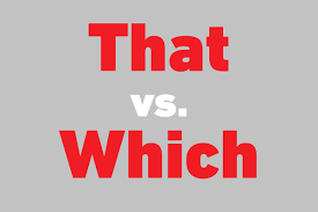 THAT vs. WHICH or WHICH vs. THAT: no matter which way you list them, these words cause a heap of mischief. I'm happy to manage that mischief by explaining how and when to use each one. So read on, my friends, and all will be explained in easy-to-understand language. WHICH should always follow a comma, with the noun it explains placed right before it. Here's an example, with scholarship as the object noun tied to WHICH: Ginger desperately hoped to win the scholarship, which was open to all student athletes. Could you use THAT instead of which in the above sentence? Not without changing the sentence around, which I will do below. THAT is used inside your main sentence (independent clause). As promised, here's the original example restated: The scholarship that Ginger desperately hoped to win was open to all student athletes. The 1st sentence has "Ginger" as its subject, while the 2nd sentence has "the scholarship" as its subject. In grammar terms, THAT sets off an essential (restrictive) clause, WHICH means it isn't separated by commas. Sometimes, however, using WHICH instead of THAT can change a sentence's meaning. Here's an example: Our dog that came from Arkansas is very energetic. Our dog, which came from Arkansas, is very energetic. The 1st sentence implies you own more than one dog. The 2nd sentence implies you own one dog only and it came from Arkansas. Special grammar note: The way the 2nd sentence is constructed, "which" is part of an appositive phrase: if lifted out of the sentence, the sentence will still make sense. Without the appositive phrase, it would read, "Our dog came from Arkansas." That helps to explain why the 2nd sentence implies a single dog. This helpful post came from a reader's question, so please, keep your questions coming!! Thank you for reading and sharing A Spoonful of Grammar. Sincerely, Laura Fineberg Cooper
5 Comments
2/16/2020 04:51:41 pm
Well, this certainly clears things up. I'll have to read your explanations several times and set them to memory for the next time I run into a which or that situation. Sometimes "who" gets in my way, too, especially when referring to people. A girl who or a girl that... :) Thanks!
Reply
Helen Kitrosser
2/16/2020 05:53:11 pm
This grammar problem is also a big worry for me. I too would like the answer to Marcia's "who vs. that" question. Thanks for adding these explanations to your blog.
Reply
2/16/2020 06:30:22 pm
Dear Marcia and Helen,
Reply
2/17/2020 06:50:14 am
Perfect! Happy to hear this answer. It agrees with what I thought, but because I often see "that" instead of "who", I sometimes second guess myself. Thank you, Laura!
Reply
Helen Kitrosser
2/18/2020 01:03:42 pm
Laura, thank you for your answer to our question and to your Spoonful #50; they make sense and now will help me to feel surer about the wording that I use.
Reply
Leave a Reply. |
Welcome to
|
 RSS Feed
RSS Feed
